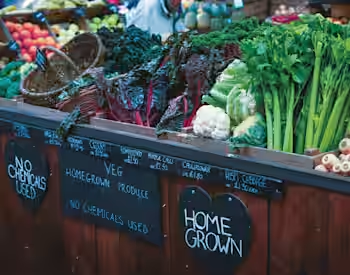Key developments in the plant-based foods sector - Part 2

Industry developments
'EatBalanced' campaign launched in response to VeganuaryThe Agriculture and Horticulture Development Board (AHDB) has launched a campaign, including a television advertisement, to promote its position that eating a balanced diet that includes red meat and dairy is a sustainable way to enjoy food.
The AHDB has stated: "There is a consistent trend that consumers are reducing their red meat and dairy consumption because they believe it is healthier and less harmful to the environment. This is not the case and we want to redress the balance by educating consumers".
Asda trials vegan 'butcher counter' concept
Asda has announced a partnership with vegan concept creator Kbox Global to trial a vegan 'butcher counter' in one of its supermarkets. Located at Asda’s Watford store, the counter, which is opening during Veganuary, will have a consistent vegan 'butcher' offering – including 'facon', bean burgers, and meat-free 'meatballs'. Asda has reported a 175% year-over-year increase in online searches for ‘vegan’ on asda.com, and is forecasting vegan sales in January to increase 391% year-over-year.
Nando's launches plant-based alternative to chicken for the first time
Nando’s has for the first time launched a plant-based alternative to its peri-peri chicken. The restaurant chain has publicised that 'The Great Imitator' is made entirely from pea protein and carries under half the carbon footprint of its chicken alternative.
Iceland Foods’ vegan meat brand acquired by the LIVEKINDLY Collective
The LIVEKINDLY Collective, a collection of plant-based heritage and start-up companies, has acquired Iceland Foods’ vegan meat brand 'No Meat'. Iceland launched the 'No Meat' range in 2018 with the release of its now award-winning 'No Bull' burger.
France obtains its first Michelin star for a vegan restaurant
A vegan restaurant in south-west France is the first of its kind in the country to win a Michelin star. The restaurant, ONA, which stands for Origine Non Animale, in the city of Ares, near Bordeaux, was launched in 2016 after receiving crowdfunding and a loan from a green bank. The restaurant has also won a green star, which Michelin introduced last year to reward establishments with a strong record for ethical practices.
Regulatory Update
Advertising Standards Authority publishes advice on advertising vegan and vegetarian products
The Advertising Standards Authority (ASA) has reported that research shows that, alongside animal welfare, consumers making commitments to campaigns like 'Veganuary' often cite health and environmental concerns among their motivations, but that these do not always translate into appropriate claims in marketing communications.
The ASA has published advice to help businesses navigate through marketing pitfalls when advertising vegan and vegetarian products. The advice references the ASA's investigation in January 2020 of adverts for Burger King’s “Rebel Whopper”.
The adverts included the language “plant-based burger” and “100% WHOPPER. NO BEEF”, in circumstances where the patty was cooked alongside meat products and the finished burger contained egg mayonnaise.
The ASA found that the adverts’ copy, green colour palette and publication during Veganuary were likely to contribute to the impression that the product was suitable for vegans and vegetarians, when this was not the case.
Guidance on 'allergen-free' and vegan claims
In February last year, the Food and Drink Federation (FDF) published guidance on 'allergen-free' and vegan claims. The FDF has warned that food products labelled as ‘suitable for vegans’ may not be appropriate for consumers with certain allergies, due to unintentional cross-contact of the products with allergenic ingredients of animal origin (such as milk, fish, crustacean, mollusc and egg ingredients).
Oatly succeeds in trademark appeal to the EU General Court
The Second Chamber of the EU General Court has upheld a trademark appeal brought by vegan food brand Oatly, overturning an earlier decision by the European Union Intellectual Property Office (EUIPO). In 2019, Oatly applied to register ‘It’s Like Milk But Made For Humans’ as a trademark in the EU. The EUIPO raised objections to the mark’s registration in relation to certain products, including dairy substitute foodstuffs and beverages. Oatly appealed, arguing that the EUIPO did not properly examine the distinctiveness of the applied-for mark in respect of the products in issue. The EU General Court found that the applied-for mark does have the minimum degree of distinctive character required by EU trademark law and annulled the decision of the EUIPO.

